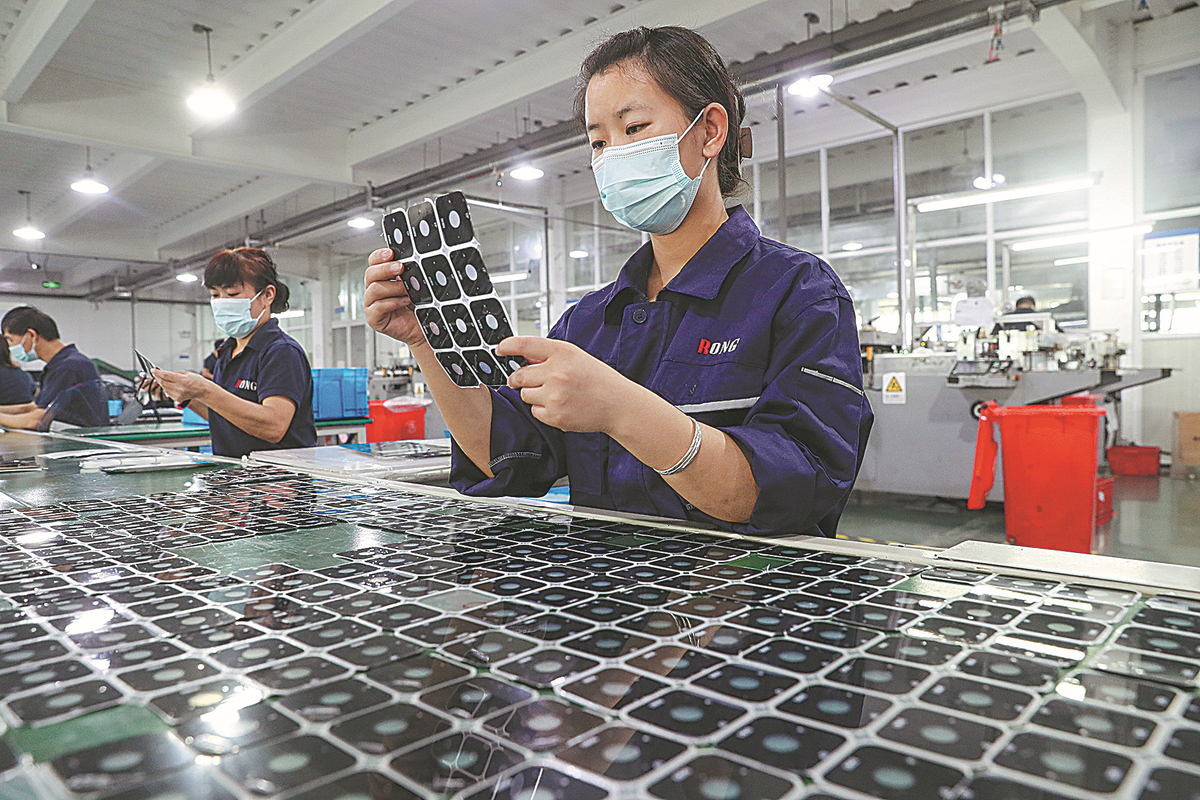Local efforts intensify to stabilize macro scene

Employees work on the production line of an electronics company in Huzhou, Zhejiang province. [Photo by Wang Shucheng/For China Daily]
Provinces, municipalities, regions follow up on calls at teleconference
Local governments across China are accelerating measures to stabilize the economy after the central leadership issued a call to intensify efforts for second-quarter growth.
Experts said despite weakening economic activity since March amid domestic COVID-19 cases and changes in the international environment, China has ample policy tools in hand and a relatively large capacity to step up macro support for the economy.
They said they expect better control of the pandemic and stronger policy support to effect a rebound in some key economic indicators in the coming months.
Their remarks were in response to a national teleconference on Wednesday that Premier Li Keqiang addressed and where it was stressed that stabilizing the fundamentals of the economy and ensuring growth are key solutions to problems that China currently faces.
Li called for heightened efforts to ensure economic growth in the second quarter and bring down the unemployment rate, saying that government aid packages must be extended to all eligible businesses.
Following the national teleconference, provincial-level governments including those of Zhejiang, Hunan and Hubei provinces have pledged intensified efforts to get the economy back on a the normal track and keep economic operations within a reasonable range.
East China's Zhejiang province held a meeting on Wednesday to call for intensified efforts to implement national policies, especially those for easing various pressures on enterprises. More efforts will also be made to speed up the implementation of key projects, promote steady growth of industry, foreign trade and investment, and spur consumption of big-ticket consumer goods like cars and home appliances.
Hunan province called for more efforts to implement national policies and measures mapped out by the national teleconference, with a focus on stabilizing growth, keeping market entities afloat and stabilizing employment.
Hubei in Central China also held a meeting on Wednesday, where it was stressed the local administration will study and implement national measures aimed at stabilizing the economy. It will make more efforts to implement key infrastructure projects in fields like water conservancy, transportation, energy, "new infrastructure" and new urbanization, mitigate difficulties for enterprises, continuously boast a better business environment, keep industrial and supply chains stable and boost consumption.
Experts lauded the country's intensified efforts to stabilize the overall economy, saying more efforts should be made to further stimulate domestic demand by expanding effective investment and promoting consumption.
Guo Chunli, director of the Chinese Academy of Macroeconomic Research's economic research institute, said consumption plays a key role in smoothing China's internal circulation and propping up economic growth, and fully unleashing consumption demand will also help the nation foster a complete domestic demand system, build a strong national market and implement the new "dual-circulation" development paradigm consistently.
In its recent executive meeting, the State Council, China's Cabinet, rolled out 33 additional measures to stabilize growth. The measures include expanding the amount of tax relief, expanding effective investment and spurring consumption.
China's southern metropolis of Shenzhen in Guangdong province recently unveiled a slew of key measures, such as spurring car consumption, to promote a gradual recovery in consumption.
According to a new document released by the Development and Reform Commission of Shenzhen and five other local departments, the city will offer up to 10,000 yuan ($1,486) in subsidies per vehicle to consumers who purchase new energy vehicles eligible for the policies and register them in Shenzhen.
In terms of boosting spending on consumer electronics and home appliances, the document said the city will offer up to 2,000 yuan subsidies for consumers who buy products such as mobile phones, computers, headphones, air conditioners and refrigerators during the period from May to August. And the subsidy amount will be 15 percent of the actual purchase price.
Yue Xiangyu, an analyst at the Shanghai University of Finance and Economics' Institute for the Development of Chinese Economic Thought, spoke highly of China's heightened efforts to spur consumption, saying the local government's moves, including giving consumption coupons and subsidies, will help promote gradual recovery in consumption.
Upon better control of the pandemic and stronger fiscal and monetary support, China's economy may gradually rebound in the third quarter after weakening in the second quarter, he said.
Photos
Related Stories
- Former vice minister of finance voices confidence in China's economy of second half-year
- Global firms remain bullish on China, survey shows
- China’s economy gets off to a steady start in Q1
- Bright spots seen in China’s future economic growth in investment, consumption, new infrastructure
- China moves to support small firms, while keeping loan rates unchanged
Copyright © 2022 People's Daily Online. All Rights Reserved.










